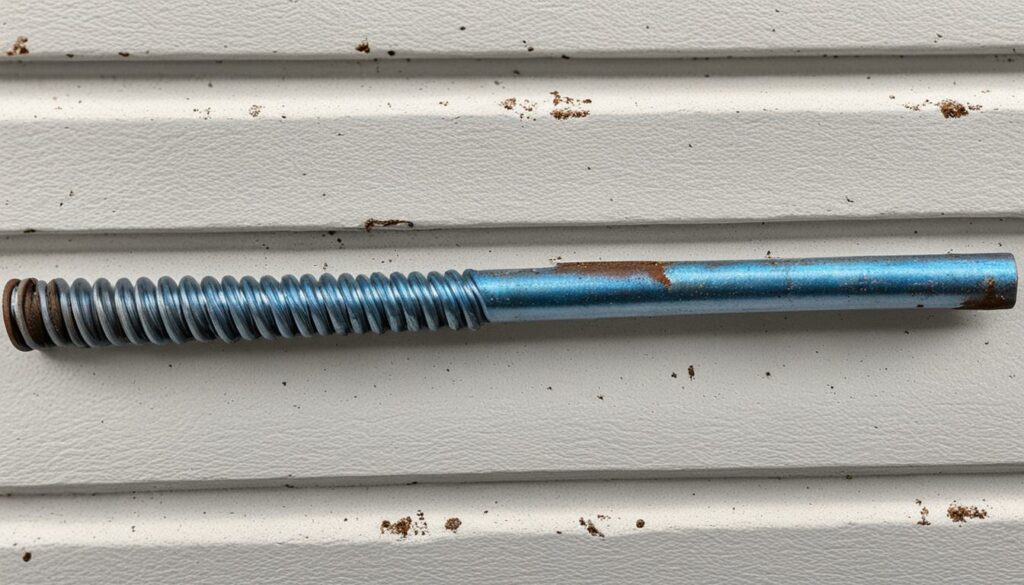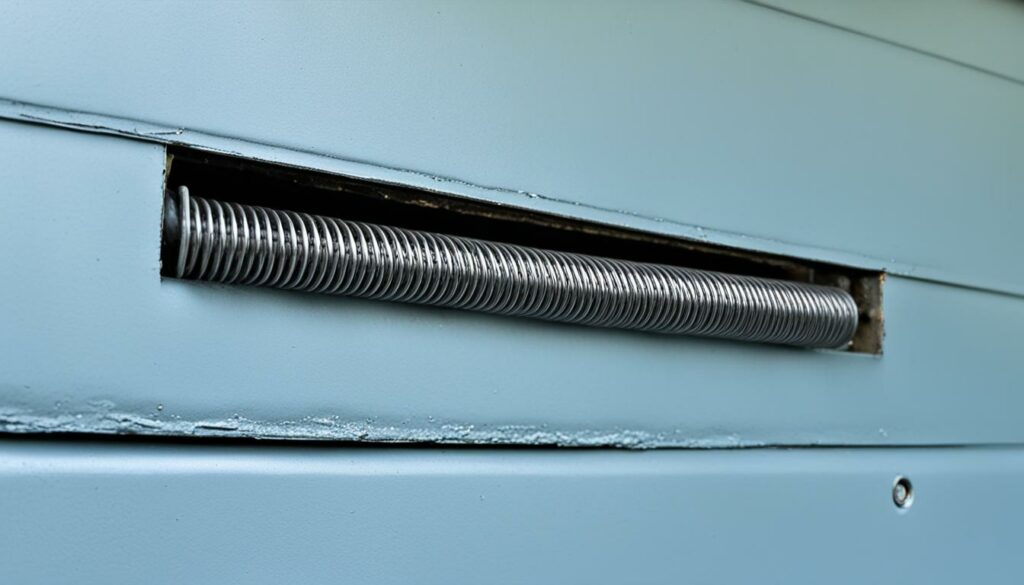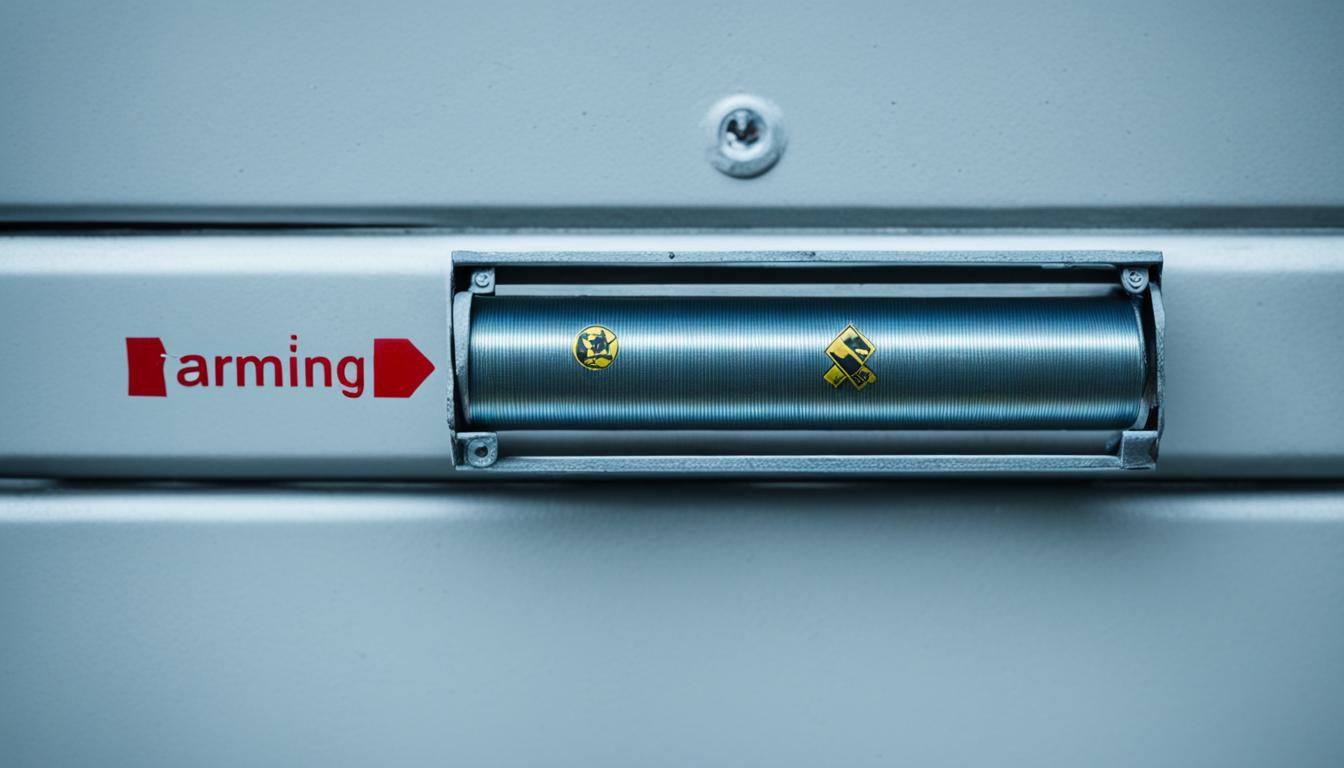Did you know that an estimated 20,000 people in the U.S. are hospitalized every year due to injuries related to garage doors? Among these incidents, a significant number are associated with garage door spring failures. Garage door springs are essential components that facilitate the lifting and closing of the garage door. They are under constant tension and can be extremely dangerous if they fail. Torsion springs and extension springs both operate under tension and have the potential to cause injury or damage if they suddenly break. The importance of garage door spring safety cannot be overstated.
Common reasons for spring failure include metal fatigue after around 10,000 cycles, rust and corrosion, and inadequate maintenance. The weight of some garage doors can exceed 200 pounds, making proper functioning of the springs crucial. To minimize garage door spring risks, it is generally recommended to have a professional inspect and replace garage door springs when they approach their end of life. Regularly checking cables for wear and rust, lubricating the springs, and ensuring the presence of safety cables are critical steps toward maintenance. Sudden garage door spring failures can cause serious harm to individuals nearby or damage property within the garage.
Key Takeaways
- Garage door spring safety is critical as they operate under high tension.
- Springs can fail due to metal fatigue, rust, or inadequate maintenance.
- Professional inspection and timely replacement can minimise garage door spring risks.
- The weight of garage doors can exceed 200 pounds, making the proper function of springs vital.
- Safety cables are essential to prevent violent spring failures.
- Proper lubrication helps in reducing rust and corrosion, prolonging spring lifespan.
Is it dangerous when a garage door spring breaks?
When it comes to the dangers of broken garage door springs, the risks cannot be overstated. These springs, designed to last approximately 10,000 cycles, eventually fail primarily due to fatigue. Given that an average garage door can weigh 200 pounds or more, the tension within these springs is considerable. Unfortunately, around 70% of all garage door spring failures occur suddenly, without any prior warning.
The dangers of broken garage door springs stem from the violent release of energy that occurs upon failure. This sudden breakage can lead to severe injuries to individuals nearby and cause significant property damage. For instance, rapid spring failure may turn broken pieces into high-speed projectiles, creating hazardous conditions within the vicinity.
Statistics show that according to the Consumer Product Safety Commission, an estimated 20,000 people are taken to U.S. hospitals each year due to injuries related to their garage doors. Moreover, spring-related mishaps alone account for a significant portion of these incidents. The National Electronic Injury Surveillance System (NEISS) also highlights that about 2.03% of emergency department visits involving home improvement tools are linked to garage doors, underscoring the potential hazards of garage door spring breakage risks.
| Reason for Spring Failure | Implications |
|---|---|
| Fatigue from wear and tear | Most common reason for failure |
| Rust and Corrosion | Increases risk of sudden breakage |
| Lack of Maintenance | Contributes to unexpected failures |
Professional inspection is crucial in mitigating these risks. By identifying potential spring failures in advance, professionals can reduce the dangers of broken garage door springs and preempt accidents. Safety measures, including the installation of safety cables, can also prevent springs from causing harm should they break.
In summation, the abrupt nature of spring failures and their potential for violent breakage highlight the need for regular maintenance and professional assessment to curtail garage door spring breakage risks. Understanding these dangers and taking precautionary steps is essential to ensuring safety.
For more information about Are Garage Door Springs Dangerous?, visit our page on garage door repairs Morayfield.
What makes garage door springs hazardous?
Understanding the risks of garage door springs is crucial due to the immense tension they operate under. This tension allows the springs to support and balance the weight of garage doors, which can weigh over 200 pounds. When a spring fails, the energy release can mimic the force of a loaded gun firing a bullet, making the situation extremely dangerous.
Rust and corrosion are significant factors that can weaken the springs and lead to sudden failure if not replaced in time. Garage door springs are designed to last for about 10,000 cycles, roughly corresponding to 7 years if the door is used around four times daily. However, regular wear and tear over thousands of cycles can increase the chances of catastrophic failure.
Improper installation or lack of maintenance can also compromise the integrity of the springs. Here are critical factors contributing to the hazardous nature of garage door springs:
- Fatigue and malfunction: Springs commonly fail due to fatigue over time.
- Rust and corrosion: These elements can weaken springs, causing unexpected failures.
- Improper installation: A poorly installed spring is more likely to fail even if it is relatively new.
Regular maintenance and lubrication are critical steps to extend the lifespan of garage door springs and minimise the risk of failure. Safety cables are also recommended to prevent a spring from flying apart in case of breakage, thereby enhancing overall safety during the operation.
| Issue | Impact |
|---|---|
| Fatigue and Malfunction | Common cause of spring failure |
| Rust and Corrosion | Weakens the springs, leading to sudden failure |
| Improper Installation | Increases likelihood of early spring failure |
| Insufficient Maintenance | Accelerates wear and tear, reducing lifespan |
Professional inspection and timely replacement are essential safety measures to avoid accidents and injuries related to garage door springs. An estimated 20,000 people are taken to U.S hospitals every year due to injuries related to garage doors, while around 30,000 injuries are caused by garage doors and openers annually in the United States, with a significant number linked to spring-related accidents. By effectively understanding garage door spring hazards, homeowners can take the necessary steps to ensure their safety and the proper functioning of their garage doors.
How often do springs break on garage doors?

The frequency of garage door spring failure is heavily influenced by several factors, including the number of cycles and the quality of maintenance performed. On average, a garage door spring is rated to last for about 8,000 to 10,000 cycles. For most homeowners, this translates to a lifespan of garage door springs that ranges between 7 to 9 years, given typical use.
However, certain conditions can lead to premature failure. For instance, the lack of regular maintenance, specifically lubrication, can expedite wear and tear. Experts also note that rust significantly shortens the lifespan of garage door springs, especially in regions with high humidity, frequent rainfall, or coastal environments. The average spring begins to break within approximately 10,000 cycles, particularly during the winter months when the cold exacerbates any existing weaknesses.
An outlier in this pattern is the Impact Doors, which stands out by enduring up to 80,000 cycles. This exceptional durability illustrates the impact that high-quality materials and design can have on the lifespan of garage door springs.
Additionally, it’s crucial to understand that torsion springs carry a higher risk during replacement due to the substantial energy they store. In contrast, extension springs pose less risk but still require careful handling. Given these factors, homeowners are strongly advised to have their springs inspected and serviced by professionals like Impact Doors, which has been providing quality replacements for over fifty years in Madison and Cross Plains, Wisconsin.
Timely inspections and servicing not only help in identifying early signs of wear but can also prevent unexpected breakages. Here’s a summary of the key factors influencing the frequency of garage door spring failure and their respective lifespans:
| Condition | Influence on Spring Lifespan |
|---|---|
| Regular Maintenance | Prolongs lifespan |
| Seasonal Changes (Winter) | Increases failure frequency |
| Rust and Corrosion | Shortens lifespan |
| Material Quality | Greatly affects endurance (e.g., Impact Doors) |
Can a garage door spring fly off?

Garage door spring detachment can indeed occur due to the high tension these springs operate under. When a spring breaks, it releases stored energy abruptly, potentially causing metal parts to fly off, posing significant risks to nearby individuals or property.
Securing garage door springs with safety cables is a crucial step to mitigate these dangers. Safety cables are designed to contain the spring and prevent it from becoming a projectile. Proper installation of these cables is essential for both torsion and extension springs to ensure effective containment and safety.
Most garage door springs are engineered to last for about 10,000 cycles, roughly translating to seven years if used four times daily. Over time, metal fatigue becomes the predominant reason for failure. Regular maintenance and lubrication, approximately three to four times per year, can extend their lifespan considerably. Inspection by professionals, especially nearing the spring’s end of life, is highly recommended to avoid accidents.
Torsion springs, with proper upkeep, can last between 14 to 20 years depending on their cycles, while extension springs are more prone to erratic motion and violent snap-offs. Not addressing a broken spring promptly may lead to further damage, such as the door crashing down or the opener failing.
Given the sheer weight of garage door springs, sometimes around 200 pounds or more, and the potential danger of sudden failure, securing garage door springs through professional servicing is imperative. Ensuring the presence of safety cables and conducting regular inspections will contribute significantly to preventing harmful spring detachments.
Why is it important to upkeep your garage door spring?
Understanding the importance of garage door spring maintenance cannot be overstated. These essential components bear the significant weight of the door, typically between 200-400 pounds, making their upkeep critical for safety. Regular maintenance helps circumvent potential accidents, such as falls and property damage, often associated with worn springs.
The Consumer Product Safety Commission highlights that annually, approximately 30,000 injuries are attributed to garage doors, with a significant portion linked to spring-related issues. Recognizing the signs of worn garage door springs, such as unusual noises, slow movement, and unevenly lifting doors, can pre-empt these dangers.
Lubrication is a straightforward yet vital method to maintain springs, protecting them against rust and reducing wear. Additionally, professional inspections play a crucial role. Companies like Impact Doors emphasise early detection through routine check-ups, identifying and addressing potential issues before they escalate into serious problems.
Statistics reveal that garage door springs have an average lifespan of 7-10 years or approximately 10,000 cycles. However, without regular upkeep, their longevity significantly diminishes, leading to abrupt failures. Between 1990 and 2007, roughly 2.03% of home improvement tool-related emergency visits were due to garage door issues.
Concrete examples underscore the risks: A homeowner tried to repair their garage door spring independently and ended up with injuries and even higher repair costs. Meanwhile, a DASMA report attributes 47% of serious injuries or fatalities among professional installers to garage door spring accidents.
A balanced maintenance routine incorporates both professional checks and DIY tasks. Regularly inspecting and lubricating the springs, along with professional assessments, ensures these components function optimally. Ignoring maintenance elevates risks—a lesson emphasised by the numerous injuries reported each year.
The ultimate takeaway remains the pivotal nature of regular maintenance and professional involvement in extending the life of your garage door springs and mitigating serious safety threats.
If you need a garage door spring professional call Impact Doors
When it comes to maintaining or repairing garage door springs, trusting a professional garage door spring service is essential. Garage doors are heavy, with single doors weighing between 100 to 250 pounds (45 to 113 kilograms), while double doors can weigh from 200 to 450 pounds (91 to 204 kilograms). This significant weight, combined with the tension in the springs, necessitates the expertise of trained professionals to ensure safety and proper operation.
Operating a garage door with a broken door torsion springs can be hazardous, often leading to sudden movements of the door and increasing the risk of injury. Furthermore, using the garage door opener under such conditions can strain the motor, causing it to overheat and potentially burnout. Indications of a failing spring include difficulty in operating the door, unusual noises, uneven door movement, and visible wear and tear on the springs.
The challenges of manually lifting a garage door without functional springs underscore the need for professional intervention. Trained experts from Impact Doors provide comprehensive inspection and maintenance services, ensuring that any potential issues are addressed before they escalate. Their services also come with warranties of up to 2 years, offering peace of mind with every repair.
DIY repairs on garage door torsion springs should be avoided due to the high tension and associated risks, which can lead to severe injuries. Hiring professionals not only guarantees safety but can also be cost-effective in the long run, as trial and error can result in higher expenses. For reliable and safe garage door spring repairs, contact Impact Doors for proficient service and a seamless experience.
FAQ
Are garage door springs dangerous?
Yes, garage door springs are indeed dangerous. They are under constant tension to facilitate the lifting and closing of the garage door. This tension can cause severe injuries or damage if the springs break suddenly, leading to violent release of stored energy.
Is it dangerous when a garage door spring breaks?
Absolutely. When a garage door spring breaks, the sudden release of energy can cause parts to become projectiles, leading to serious injury or significant property damage. Professional assessment and replacement are crucial to prevent such dangers.
What makes garage door springs hazardous?
Garage door springs are hazardous due to the immense tension they operate under. This tension supports and balances heavy garage doors, and when it fails, the energy released can be as dangerous as a loaded gun firing a bullet. Rust, corrosion, and wear over thousands of cycles increase the risk of catastrophic failure.
How often do springs break on garage doors?
Garage door springs typically endure around 10,000 cycles, translating to about 7 to 10 years of average use. However, daily wear and tear, inadequate maintenance, and environmental factors can significantly reduce this lifespan. Regular inspections and maintenance can help identify early signs of wear.
Can a garage door spring fly off?
Yes, a garage door spring can fly off if it breaks due to the high tension it operates under. The sudden release of energy upon breakage can lead to metal parts becoming projectiles, posing a risk to nearby individuals and objects. Safety cables can help mitigate this risk if correctly installed.
Why is it important to upkeep your garage door spring?
Regular maintenance of garage door springs is crucial for safety and longevity. This includes lubricating springs to protect against rust, checking cables for wear and rust, and inspecting for signs of wear such as strange noises or uneven lifting. Professional inspections can also identify and rectify risky factors like corrosion or wear.
If you need a garage door spring professional, call Impact Doors
If your garage door spring requires repair or replacement, it is highly recommended to hire a professional technician. Impact Doors has trained experts skilled in safely handling and maintaining high-tension springs. DIY repairs can be risky and lead to further damage or injury. Trust Impact Doors for proficient service, safety, and peace of mind.
Garage Door Spring Repair Near You
For any assistance with garage door spring repairs, contact Jarred at Impact Doors. Our experienced team is ready to help you with all your garage door needs. Don’t hesitate to call us at (07) 5451 4022 to schedule a service or get expert advice. Your garage door’s optimal performance is just a phone call away!

